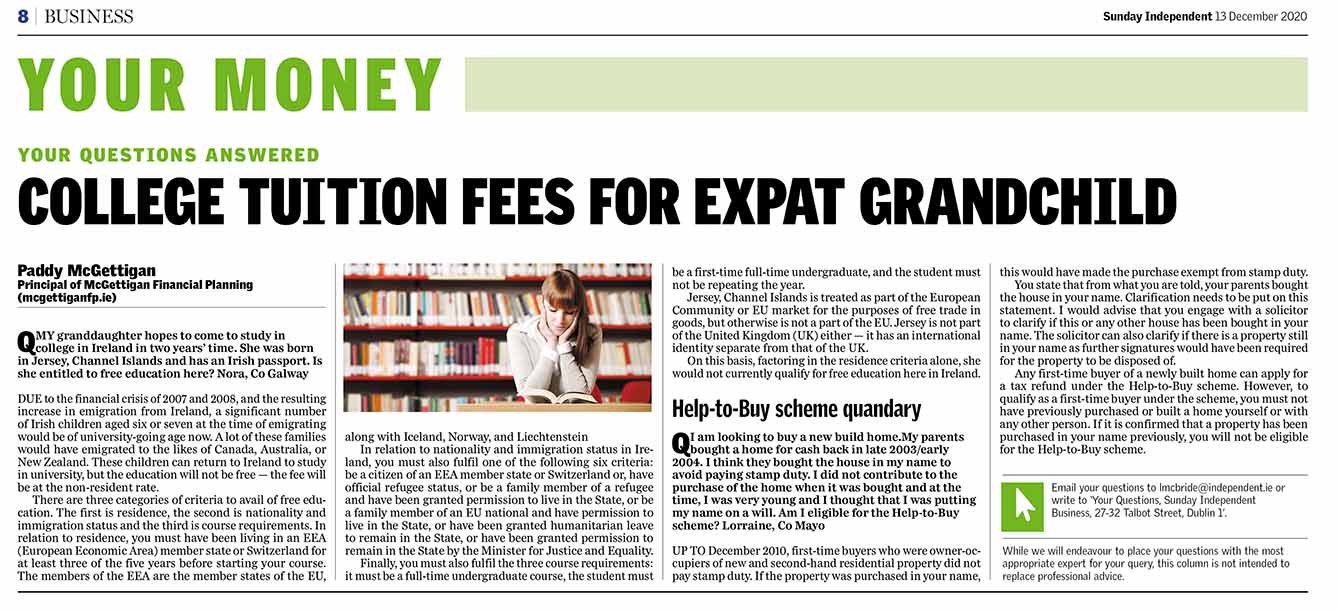Independent Articles
College Tuition Fees for Expat Grandchild
“MY granddaughter hopes to come to study in college in Ireland in two years’ time. She was born in Jersey, Channel Islands and has an Irish passport. Is she entitled to free education here?”
Nora, Co Galway
DUE to the financial crisis of 2007 and 2008, and the resulting increase in emigration from Ireland, a significant number of Irish children aged six or seven at the time of emigrating would be of university-going age now. A lot of these families would have emigrated to the likes of Canada, Australia, or New Zealand. These children can return to Ireland to study in university, but the education will not be free — the fee will be at the non-resident rate.
There are three categories of criteria to avail of free education. The first is residence, the second is nationality and immigration status and the third is course requirements. In relation to residence, you must have been living in an EEA (European Economic Area) member state or Switzerland for at least three of the five years before starting your course. The members of the EEA are the member states of the EU, along with Iceland, Norway, and Liechtenstein.
In relation to nationality and immigration status in Ireland, you must also fulfil one of the following six criteria: be a citizen of an EEA member state or Switzerland or, have official refugee status, or be a family member of a refugee and have been granted permission to live in the State, or be a family member of an EU national and have permission to live in the State, or have been granted humanitarian leave to remain in the State, or have been granted permission to remain in the State by the Minister for Justice and Equality.
Finally, you must also fulfil the three course requirements: it must be a full-time undergraduate course, the student must be a first-time full-time undergraduate, and the student must not be repeating the year. Jersey, Channel Islands is treated as part of the European Community or EU market for the purposes of free trade in goods, but otherwise is not a part of the EU. Jersey is not part of the United Kingdom (UK) either — it has an international identity separate from that of the UK. On this basis, factoring in the residence criteria alone, she would not currently qualify for free education here in Ireland. Help-to-Buy scheme quandary
“I am looking to buy a new build home.My parents bought a home for cash back in late 2003/early 2004. I think they bought the house in my name to avoid paying stamp duty. I did not contribute to the purchase of the home when it was bought and at the time, I was very young and I thought that I was putting my name on a will. Am I eligible for the Help-to-Buy scheme?”
Lorraine, Co Mayo
UP TO December 2010, first-time buyers who were owner-occupiers of new and second-hand residential property did not pay stamp duty. If the property was purchased in your name, this would have made the purchase exempt from stamp duty.
You state that from what you are told, your parents bought the house in your name. Clarification needs to be put on this statement. I would advise that you engage with a solicitor to clarify if this or any other house has been bought in your name. The solicitor can also clarify if there is a property still in your name as further signatures would have been required for the property to be disposed of.
Any first-time buyer of a newly built home can apply for a tax refund under the Help-to-Buy scheme. However, to qualify as a first-time buyer under the scheme, you must not have previously purchased or built a home yourself or with any other person. If it is confirmed that a property has been purchased in your name previously, you will not be eligible for the Help-to-Buy scheme.


